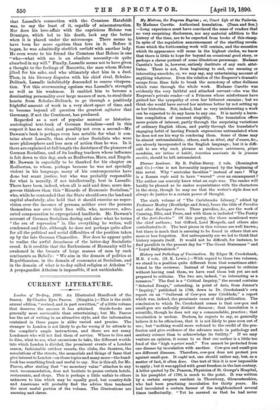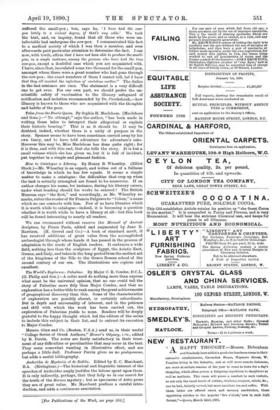History and Pathology of Vaccination. By Edgar M. Crookshank, M.B.
2 vols. (H. K. Lewis.)—With regard to these two volumes, we stand in a position quite different from that sometimes attri- buted to the reviewer. Instead of being prepared to criticise without having read them, we have read them but yet are not prepared to criticise. The two are, indeed, "as interesting as a romance." The first is a "Critical Inquiry," the second contains "Selected Essays," extending, in point of date, from Jenner's "Inquiry," published in 1798, down to Dr. Crookshank's own report on an "Outbreak of Cow-pox near Cricklade," a report which was, indeed, the proximate cause of this publication. The conclusion to which Dr. Crookshank comes is that cow-pox and small-pox are radically distinct diseases ; that inoculation is a scientific, though he does not say a commendable, practice ; that vaccination is useless. Doctors, he regrets to say, so generally believe it to be efficacious, that it is not likely to pass soon out of use; but "nothing would more redound to the credit of the pro- fession and give evidence of the advance made in pathology and sanitary science than to acknowledge its futility." If we may
venture an opinion, it seems to us that our author is a little too fond of the "high a-priori road." You cannot be protected from one disease by inoculation with another. Cow-pox and small-pox
are different diseases. Therefore, cow-pox does not protect you against small-pox. It ought not, one should rather say, but, as a, matter of fact, it often does. One test of this it is now impossible
to apply ; but it was applied with great freedom in the last century.
A letter quoted by Dr. Pearson, Physician of St. George's Hospital, in his pamphlet of 1798, is much to the point. It was written by a certain surgeon resident in Thornbury, Gloucestershire, who had been practising inoculation for thirty years. He had inoculated a certain farmer of the neighbourhood several times ineffectually. "Yet he assured us that he had never .suffered the small-pox; but, says he, 'I have had the cow- pox lately to a violent degree, if that's any odds.' We took the hint, and, on inquiry, found that all those who were un- infectable had undergone the cow-pox. I communicated this fact to a medical society of which I was then a member, and ever afterwards paid particular attention to determine the fact. I can now, with truth, affirm that I have not been able to produce the small- pox, in m single instance, among the persons who have had the true cow-pox, except a doubtful case which you are acquainted with. I have, since that, inoculated some two thousand for the small-pox, amongst whom there were a great number who had gone through the cow-pox; the exact numbers of these I cannot tell, but I know that they all resisted the infection of nark/IOUs matter." The italics in the last sentence are ours. The statement is a very difficult one to get over. For our own part, we should prefer the un- scientific safety of vaccination to the illusory safeguard of notification and isolation recommended by Dr. Crookshank,—how illusory is known to those who are acquainted with the thoughts and habits of the poor.



















































 Previous page
Previous page